#Streaming Music
Explore tagged Tumblr posts
Text
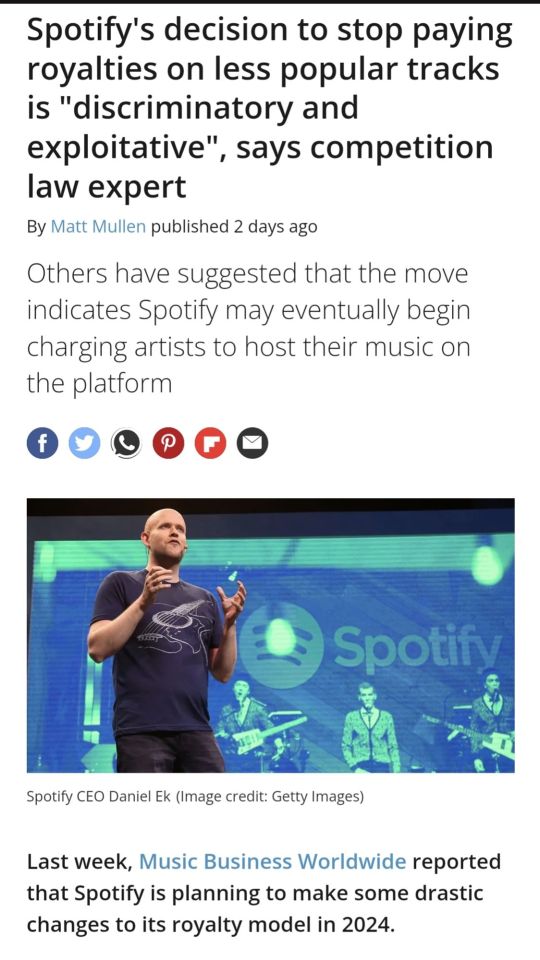

Just one more reason to not use Spotify -_-
Link to story here
#spotify#streaming platforms#they're all exploitative#but this one might be the worst#streaming#streaming music
21K notes
·
View notes
Text
How much is your favourite artist really being paid?
(Per stream)
Spotify: $0.003 - $0.005
TIDAL: $0.0125 - $0.015
YouTube Music: $0.001 - $0.003
Amazon music: $0.004 - $0.007
Napster: $0.019 - $0.021
Deezer: $0.005 - $0.007

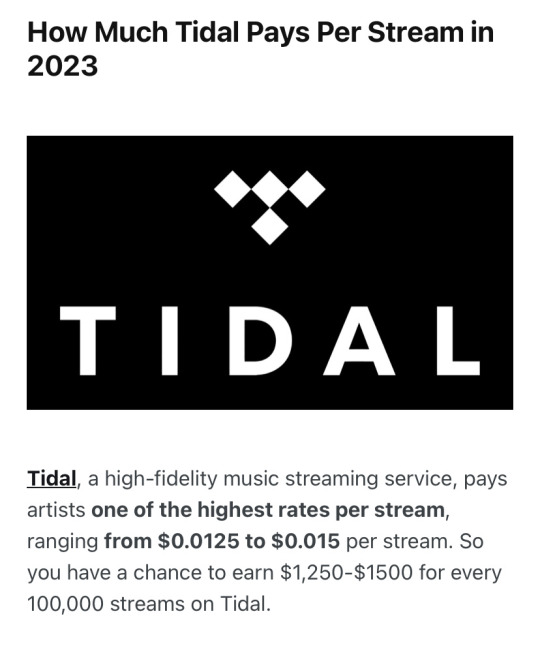
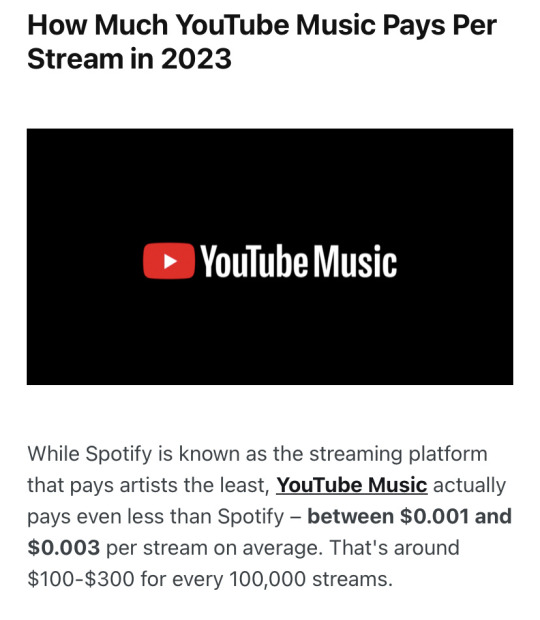

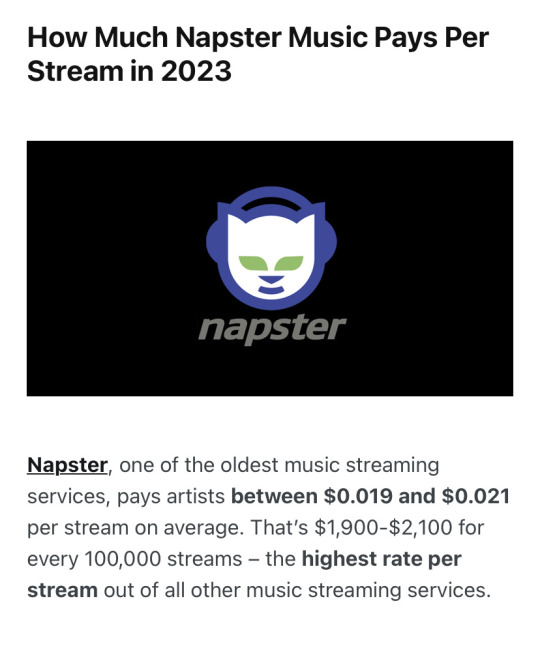
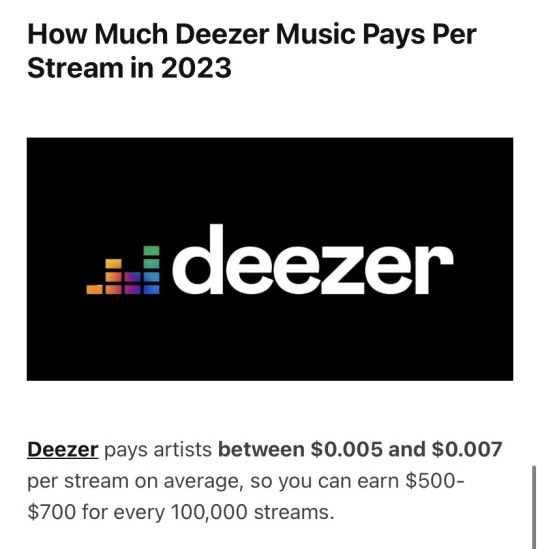
Support artist, choose a platform that not only pays well but supports artists!!!
#YouTube#YouTube music#Deezer#Napster#tidal#Spotify#Spotify wrapped#Amazon music#music#music streaming#streaming#streaming music
571 notes
·
View notes
Text
#music#spotify#apple music#youtube music#pandora#soundcloud#amazon music#poll time#tumblr polls#my polls#polls#random polls#streaming services#streaming music
19 notes
·
View notes
Text
Official Lyrics Video for the song "Player One (Back in the Game)" presented by Radio Akashica
2 notes
·
View notes
Text

"Brush With The Blues: A Tribute to Jeff Beck" out now wherever you get music 🎸🎧 Link below ⬇️
#spotify playlist#instrumental rock#artists on tumblr#guitar#joe satriani#jeff beck#blues#blues guitar#live guitar#guitarist#musician#rock#blues solo#guitar solo#spotify#apple music#youtube music#new music#music#songs#electric guitar#streaming#streaming music
3 notes
·
View notes
Text
The Exploitation Continues: The Music Industry’s Relentless Stranglehold on Artists

The music business has long been a battlefield where artists fight for survival against an industry that profits from their talent while leaving them with scraps. Yasiin Bey (formerly Mos Def) recently described the modern industry as “completely exploitative,” a stark statement that echoes the experiences of countless musicians past and present. While the exploitation of artists is not new—history is littered with cases of brilliant musicians being underpaid, uncredited, or outright robbed—modern streaming, corporate consolidation, and deceptive contracts have made the industry even more ruthless. In an era where music is more accessible than ever, artists themselves are struggling more than ever to make a living.
A History of Exploitation
Music history is filled with tales of artists who created cultural revolutions but saw little financial reward for their contributions. Take Big Mama Thornton, whose original recording of “Hound Dog” was overshadowed—and vastly out-earned—by Elvis Presley’s version. Despite being the true originator, Thornton never saw the riches her work deserved. Similarly, Little Richard, the self-proclaimed “architect of rock and roll,” was given mere pennies compared to the white artists who covered his songs and profited handsomely. Sly Stone, a genius who helped shape funk and psychedelic soul, ended up in financial ruin due to bad contracts and industry manipulation.
These are not isolated cases. Black artists, in particular, have been disproportionately affected by industry exploitation. From the early days of blues and rock to the hip-hop era, Black musicians have been routinely denied ownership of their work, cheated out of royalties, and forced into predatory contracts. Even when some managed to achieve commercial success, many still found themselves in financial turmoil due to shady business dealings.
The Streaming Era: A New Form of Robbery
While the internet was supposed to democratize music, it has instead become another tool for exploitation. Streaming services like Spotify, Apple Music, and YouTube have made music more available than ever, but they have also slashed the earnings of musicians. Consider this: an artist needs roughly 250-300 streams on Spotify to earn just one dollar. This means that even songs with millions of plays may generate only a few thousand dollars—hardly enough for most artists to sustain a career.
To put this into perspective, an artist selling a physical album in the past could earn a few dollars per sale. Now, they must amass millions of streams just to earn what they once did with a few thousand album sales. Meanwhile, streaming platforms and record labels continue to rake in billions. In 2023, Universal Music Group reported over $11 billion in revenue, yet the vast majority of that money never trickled down to the artists responsible for the music.
Even major artists have spoken out about this injustice. In 2020, Taylor Swift, one of the best-selling musicians in history, criticized Spotify’s payout model, highlighting how even top-tier artists struggle to earn fair compensation. If someone of Swift’s stature faces these challenges, what does that mean for independent artists who lack her influence?
The Illusion of Wealth in the Music Industry
One of the biggest misconceptions about the music industry is that all artists are rich. The lavish music videos, designer clothes, and luxury cars paint a picture of endless wealth, but that image is often a façade. Many artists are drowning in debt, locked into exploitative record deals, and reliant on constant touring just to stay afloat.
Record labels often advance money to artists, but these advances function more like loans. Artists must pay back everything before they see a dime of their actual earnings. This means that when a label gives an artist a million-dollar advance, that artist may not actually receive any royalties until they have recouped that million—and then some. Labels deduct expenses for marketing, production, music videos, and even personal stylists, leaving many artists in a financial hole from which they may never emerge.
Additionally, the rise of social media has created pressure for artists to maintain a lifestyle they may not actually be able to afford. Many feel compelled to appear wealthy to keep up with industry expectations, leading to excessive spending on fashion, jewelry, and other status symbols—all while struggling to make ends meet.
Why Concert Tickets Are So Expensive
One direct consequence of streaming’s poor payouts is the rising cost of concert tickets. Since recorded music no longer generates significant revenue for most artists, touring has become the primary way to make money. But with the increasing costs of production, travel, and venue fees, artists have had to raise ticket prices just to survive.
This has led to frustration among fans, who see skyrocketing ticket prices and assume greed on the part of the artists. In reality, much of the money goes to the venues, promoters, and corporations like Live Nation, which dominates the live music industry. Ticketmaster, owned by Live Nation, has been widely criticized for its excessive fees, further inflating ticket costs.
Consider a major tour:
• A significant portion of ticket revenue goes to the venue.
• Management and booking agents take their cuts.
• Touring expenses—such as equipment, transportation, and crew salaries—must be covered.
• Record labels may take a percentage if the artist is still under contract.
By the time all these expenses are deducted, artists may see only a fraction of the revenue. This is why many musicians are forced to tour relentlessly, even at the cost of their health and well-being.
The Fight for Ownership and Independence
Despite these challenges, artists are increasingly seeking ways to reclaim their power. More musicians are choosing independence, avoiding major labels, and releasing music on their own terms. Platforms like Bandcamp allow artists to sell directly to fans, ensuring they receive a fairer share of the profits. Some musicians, like Chance the Rapper, have successfully built careers without ever signing a traditional record deal.
Additionally, there is a growing push for fairer compensation from streaming services. Organizations like the Union of Musicians and Allied Workers (UMAW) have demanded higher payouts from platforms like Spotify, arguing that the current model is unsustainable for artists. Some countries, like the UK, have even begun investigating the fairness of streaming royalties, though significant change has yet to come.
The Harsh Reality of the Music Business
The sad truth is that the music industry, despite its glitz and glamour, remains one of the most exploitative industries in existence. Whether it’s the pioneers of rock and roll who were denied credit and compensation, or today’s artists struggling to make money in the streaming era, the pattern of exploitation continues. The system is designed to benefit corporations, not creators, and until fundamental changes are made, artists will continue to suffer.
As fans, the best way to support musicians is to buy their music directly, attend their shows, and purchase their merchandise from sources that ensure they receive the majority of the profits. The illusion of wealth in the music business is just that—an illusion. Behind every viral hit, platinum plaque, and sold-out tour is an artist fighting to be fairly compensated for their work.
The music industry may never become truly fair, but by understanding its exploitative nature, we can begin to shift power back to the artists who make it all possible.
#music#music business#music industry#exploitation#mos def#yasiin bey#big mama thornton#little richard#sly stone#taylor swift#concerts#spotify#streaming#streaming services#streaming music#the soul brother show#soul brother show#social commentary
1 note
·
View note
Text
A TUMBLR CREATOR COMMENTARY August 7, 2024
I went to AMAZON MUSIC for the first time in a while this morning for some sounds. I remembered that I thought it sucked, but I couldn't remember exactly why. It offered an Update Download, so I took that thinking it might be better. I then searched an artist I wanted to hear and selected. They played about three songs shuffled by him and then stopped playing the artist and gave me only COMPLETELY INCONGRUOUS songs that I would NEVER listen to! Of the first three, one was “Don't Worry Be Happy”. The third was “Eye of the Tiger”. Since the latter song sticks in your head whether you hate it or not, I wrote some new lyrics for it:
First the bombs, then hiding in bunkers
We didn't know what was happening
After they dropped, it all got real funky
Now I'm just a man with a broken Iphone
CHORUS:
I've got a Geiger counter strapped to my back
And I'm out searching endlessly for rations
I've got a Geiger counter, weapons I lack
The Apocalypse is right here right now – NS, tiger.
You would think these streaming services would get a clue and improve their algorithms to more closely match the genres their customers want to listen to – NOT MAKE THEM WORSE. Needless to say, I will continue to not be listening to AMAZON MUSIC...
#humor#comments#commentary#streaming#streaming music#music#amazon#amazon music#streaming services#annoying#annoyance#this is bullshit#complaining#complaints#wtf#like wtf#song lyrics#funny lyrics#lyrics
2 notes
·
View notes
Text
Making music is what I do so go check out my Spotify B-ragg is an artist from Seattle Washington been making music since 2012 and here you go the whole profile of mine
4 notes
·
View notes
Text
I have this idea where I'm streaming a vidya game particularly eso in my mind cause thats the one I'm the okayest at
But instead of any sound every button input I do has a corresponding musical sound to it
Like x could be a snare o a cymbal triangle a guitar lick r2 a record scratch
6 notes
·
View notes
Text
So I may be leaving spotify. What's the decent alternative, these days? Must have playlist capabilities.
6 notes
·
View notes
Text
Why let streaming apps be the bad guy when you can be the bad guy?
since spotify wrapped is coming today i just want to bring awareness to the fact that around 86% of the songs on spotify are currently demonetized since spotify decided that tracks with under 1,000 cannot be monetized. not only that the ceo of spotify cashed out $35.8 million dollars in spotify shares in the third quarter of the year and it has been reported that he earns more than the top artists on the platform.
for a platform that claims to support artists, this is outrageous and i hope people realize that an artist who is starting out, cannot make a living out of spotify streams simply because daniel ek and his friends made it worse for the artists trying to start a career. if you wanna support musicians and the possibility for them to get a living wage please follow United Musicians and Allied Workers (UMAW) which are trying to make The Living Wage for Musicians Act a reality so musicians can be paid fairly through streaming platforms and get the cut they deserve.
21K notes
·
View notes
Text
This feels relevant here.
Archived link in case you need it:
#streaming music#spotify#streaming services#anti spotify#anti streaming#Mood Machine#Liz Pelly#Rolling Stone Magazine
13 notes
·
View notes
Text
ITS DOECHII BITCH MISS D-O-E DON DADA BITCH YOU NOTICE ME!!!!!!!!!!!!!!!!!!!!!!!!!!!!!!!!!!!!!!!!!!!!!
#STREAM DOECHII NPR TINY DESK#i feel like i could run a marathon.#doechii world domination btw.#doechii#music#npr tiny desk
66K notes
·
View notes
Text
youtube
Stream "Intention" the new tune on Radio Akashica on Youtube Music.
0 notes
Link
Jazz (Deluxe) came out in January 2018. Right away, it shot up the Billboard chart and hit No. 1. Hay was elated. At last, real, measurable success had arrived..
Then, just as suddenly, the album disappeared from the ranking. “Nobody drops off the next week to zero,” says Hay, remembering his confusion. He called other artists to ask if they’d ever seen this before. They hadn’t. Questions piled up. If so many people had listened, why did they suddenly stop? He scanned the internet for chatter. Even a single freaking tweet would have been nice. Nada. Where were the fans? “No one’s talking about the music,” Hay realized.
Pulling up Spotify’s dashboard for artists, Hay scrutinized the analytics for the pair’s work. Listeners appeared concentrated in far-flung places like Vietnam. Things only got stranger from there. Here’s how Hay remembers it: He started receiving notices from distributors, the companies that handle the licensing of indie artists’ music. The distributors were flagging Smith and Hay’s music, from Jazz and from other projects, for streaming fraud and pulling it down. Smith told Hay it was a mistake and that Hay had messed up securing the proper rights for samples. Hay frantically tried to correct the issue, but the flagging persisted.
Hay, panicking, badgered Smith to help him figure out what was happening. Finally, Hay says, Smith offered some answers: Smith had instructed his staff at the medical clinics to stream their songs. It didn’t sound like the full story.
Then, last September, Smith turned up at the heart of another music streaming incident, this one rather epic. The FBI arrested him and charged him in the first AI streaming fraud case in the United States. The government claims that between 2017 and 2024, Smith made over $10 million in royalties by using bot armies to continuously play AI-generated tracks on streaming platforms. Smith pleaded not guilty to all charges. (Through his lawyer, Smith declined to be interviewed, so this is very much Hay’s side of the story, corroborated by numerous interviews with people who worked with the two men.)
This is a story about a ‘musician’ who has created albums and arranged for bot armies to play the albums millions or billions of times and pocketed a lot of royalties from streaming services, even though no human ever actually listened to the music at all. And while he was arrested, this part of the music business is actually working exactly as it was designed.
Reminds me how someone noted years ago, one day a robotaxi is going to show up at some address and whoever opens the door is going to find a person inside who died during their taxi ride. It may have already happened for all I know. But if it hasn’t happened yet, it will in the near future. Just the law of averages.
1 note
·
View note